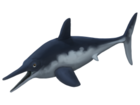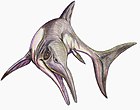Simbirskiasaurus: Difference between revisions
→Description: removing unreliable estimate Tags: Reverted references removed |
m Reverted edits by 58.228.22.162 (talk) to last version by Xiphactinus88 |
||
| Line 14: | Line 14: | ||
==Description== |
==Description== |
||
Fischer ''et al''. give the diagnosis of ''Simbirskiasaurus'' as follows: "Platypterygiine ophthalmosaurid characterized by the following autapomorphies: external naris divided by a nasomaxillary pillar; posterior opening of the narial complex with anteroposteriorly constricted dorsal extension; deeply interdigitating prefrontal–lacrimal suture [reminiscent of the basal neoichthyosaurian ''[[Temnodontosaurus platyodon]]'' (Conybeare, 1822); see Godefroit, 1993]. ''Simbirskiasaurus birjukovi'' is also characterized by the following unique combination of features: subnarial process of the premaxilla reaches the posterior margin of the external naris (shared with ''[[Cryopterygius kristiansenae]]'' Druckenmiller ''et al''., 2012); elongated anterior process of the maxilla, reaching anteriorly the level of the nasal [unlike in ''[[Aegirosaurus leptospondylus]]'' Bardet & Fernández, 2000 and ''[[Sveltonectes insolitus]]'' (Fischer ''et al''., 2011b)]; pres- ence of a supranarial process of the premaxilla [shared with ''[[Platypterygius australis]]'' (McCoy, 1867), see Kear, 2005, and possibly ''[[Pervushovisaurus|Pervushovisaurus bannovkensis]]'' (Arkhangelsky, 1998b)]."<ref name=F14/> |
''Simbirskiasaurus'' was a small ichthyosaur, measuring {{convert|3.5|m|ft}} in length and {{convert|200|kg|lbs}} in body mass.<ref>{{cite book|last=Paul|first=Gregory S.|year=2022|title=The Princeton Field Guide to Mesozoic Sea Reptiles|pages=162|isbn=9780691193809|publisher=Princeton University Press}}</ref> Fischer ''et al''. give the diagnosis of ''Simbirskiasaurus'' as follows: "Platypterygiine ophthalmosaurid characterized by the following autapomorphies: external naris divided by a nasomaxillary pillar; posterior opening of the narial complex with anteroposteriorly constricted dorsal extension; deeply interdigitating prefrontal–lacrimal suture [reminiscent of the basal neoichthyosaurian ''[[Temnodontosaurus platyodon]]'' (Conybeare, 1822); see Godefroit, 1993]. ''Simbirskiasaurus birjukovi'' is also characterized by the following unique combination of features: subnarial process of the premaxilla reaches the posterior margin of the external naris (shared with ''[[Cryopterygius kristiansenae]]'' Druckenmiller ''et al''., 2012); elongated anterior process of the maxilla, reaching anteriorly the level of the nasal [unlike in ''[[Aegirosaurus leptospondylus]]'' Bardet & Fernández, 2000 and ''[[Sveltonectes insolitus]]'' (Fischer ''et al''., 2011b)]; pres- ence of a supranarial process of the premaxilla [shared with ''[[Platypterygius australis]]'' (McCoy, 1867), see Kear, 2005, and possibly ''[[Pervushovisaurus|Pervushovisaurus bannovkensis]]'' (Arkhangelsky, 1998b)]."<ref name=F14/> |
||
==Phylogeny== |
==Phylogeny== |
||
Revision as of 02:32, 19 January 2023
| Simbirskiasaurus Temporal range: Early Cretaceous, 130 Ma
| |
|---|---|
| Scientific classification | |
| Domain: | Eukaryota |
| Kingdom: | Animalia |
| Phylum: | Chordata |
| Class: | Reptilia |
| Order: | †Ichthyosauria |
| Family: | †Ophthalmosauridae |
| Subfamily: | †Platypterygiinae |
| Genus: | †Simbirskiasaurus Ochev and Efimov, 1985 |
| Species | |
| |
Simbirskiasaurus is an extinct genus of ichthyosaur from the Early Cretaceous (early Barremian) of Ulyanovsk Oblast, Russia.[1][2] Its type specimen is YKM 65119, a fragmentary skull and vertebral column.[3]
Description
Simbirskiasaurus was a small ichthyosaur, measuring 3.5 metres (11 ft) in length and 200 kilograms (440 lb) in body mass.[4] Fischer et al. give the diagnosis of Simbirskiasaurus as follows: "Platypterygiine ophthalmosaurid characterized by the following autapomorphies: external naris divided by a nasomaxillary pillar; posterior opening of the narial complex with anteroposteriorly constricted dorsal extension; deeply interdigitating prefrontal–lacrimal suture [reminiscent of the basal neoichthyosaurian Temnodontosaurus platyodon (Conybeare, 1822); see Godefroit, 1993]. Simbirskiasaurus birjukovi is also characterized by the following unique combination of features: subnarial process of the premaxilla reaches the posterior margin of the external naris (shared with Cryopterygius kristiansenae Druckenmiller et al., 2012); elongated anterior process of the maxilla, reaching anteriorly the level of the nasal [unlike in Aegirosaurus leptospondylus Bardet & Fernández, 2000 and Sveltonectes insolitus (Fischer et al., 2011b)]; pres- ence of a supranarial process of the premaxilla [shared with Platypterygius australis (McCoy, 1867), see Kear, 2005, and possibly Pervushovisaurus bannovkensis (Arkhangelsky, 1998b)]."[2]
Phylogeny
The following cladogram shows a possible phylogenetic position of Simbirskiasaurus in Ophthalmosauridae according to the analysis performed by Zverkov and Jacobs (2020).[5]
See also
References
- ^ Sepkoski, Jack (2002). "A compendium of fossil marine animal genera (entry on Reptilia)". Bulletins of American Paleontology. 364: 560. Retrieved 2008-09-28.
- ^ a b Valentin Fischer, Maxim S. Arkhangelsky, Darren Naish, Ilya M. Stenshin, Gleb N. Uspensky and Pascal Godefroit (2014) Simbirskiasaurus and Pervushovisaurus reassessed: implications for the taxonomy and cranial osteology of Cretaceous platypterygiine ichthyosaurs. Zoological Journal of the Linnean Society 171(4): 822–841. http://onlinelibrary.wiley.com/doi/10.1111/zoj.12158/abstract
- ^ Storrs, G. W., M. S. Arkhangel'skii and V. M. Efimov. 2000. Mesozoic marine reptiles of Russia and other former Soviet republics. pages 187-210 In Benton, M. J., M. A. Shiskin, D. M. Unwin and E. N. Kurochkin, (eds.), The Age of Dinosaurs in Russia and Mongolia, Cambridge University Press, Cambridge.
- ^ Paul, Gregory S. (2022). The Princeton Field Guide to Mesozoic Sea Reptiles. Princeton University Press. p. 162. ISBN 9780691193809.
- ^ Nikolay G. Zverkov & Megan L. Jacobs (2021) [2020]. "Revision of Nannopterygius (Ichthyosauria: Ophthalmosauridae): reappraisal of the 'inaccessible' holotype resolves a taxonomic tangle and reveals an obscure ophthalmosaurid lineage with a wide distribution". Zoological Journal of the Linnean Society. 191 (1): 228–275. doi:10.1093/zoolinnean/zlaa028.








